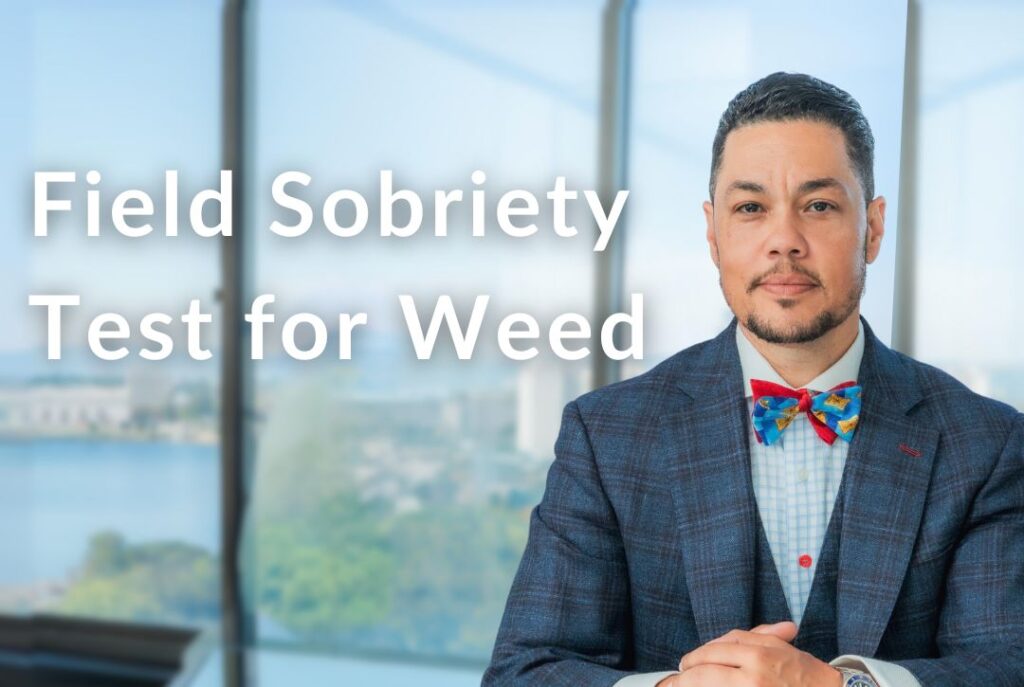Field Sobriety Test for Weed: What You Need to Know
Field Sobriety Test for Weed: What You Need to Know
With the legalization of cannabis in California, determining marijuana impairment while driving is a challenge. Standard field sobriety tests aren’t reliable for detecting weed impairment.
Despite this, law enforcement still uses these tests and THC screenings during DUI stops. These tests can sometimes give inaccurate results. In this article, we’ll explain how the field sobriety test for weed works and what to expect if you’re pulled over.
Field Sobriety Tests for Marijuana
When police suspect a driver is under the influence of marijuana, they often turn to field sobriety tests to gauge impairment. These tests consist of physical and cognitive exercises designed to detect impaired driving abilities. While these tests are commonly used for alcohol-related DUIs, they are also used for marijuana despite being less reliable for drug-related impairment.
What Qualifies as "Impaired?"
Impairment means your ability to safely operate a vehicle has been compromised by alcohol, drugs, or a combination of both. For marijuana, there is no simple “limit” like with alcohol (such as a 0.08% BAC). However, in many states, having five nanograms or more of THC per milliliter in your blood may qualify as an impairment. Even without reaching this level, you can still be arrested for drugged driving if you are deemed impaired to even the slightest degree.
Types of Field Sobriety Tests
After a traffic stop, officers often use three common field sobriety tests to assess impairment:
- One-Leg Stand Test: You are asked to stand on one foot about six inches off the ground while counting. If you wobble, lose balance, or put your foot down, the officer may suspect impairment.
- Horizontal Gaze Nystagmus Test: This involves following an object (like a pen) with your eyes while keeping your head still. If your eyes jerk involuntarily, it could indicate impairment.
- Walk-and-Turn Test: You walk in a straight line, heel to toe, for nine steps, turn on one foot, and walk back. Difficulty following instructions or losing balance can be seen as signs of impairment.
Are Field Sobriety Tests Reliable?
Field sobriety tests are often used to detect impairment, but they are not foolproof. These tests are subjective and rely heavily on the officer’s observations, which can lead to errors or misinterpretation, especially for marijuana impairment.
For example, many factors like anxiety, fatigue, or physical conditions could affect your performance, even if you’re sober. Additionally, field sobriety tests are voluntary in most states, and refusing them usually doesn’t carry legal penalties.
Request a Free Consultation
Marijuana DUI Test Methods
Aside from field sobriety tests, law enforcement may use other methods to test for marijuana impairment during a DUI stop. These methods aim to detect THC, the active ingredient in marijuana, in your system.
Saliva Swab Test
A newer method being used in some states is the saliva swab test. The officer swabs the inside of your mouth to test for the presence of drugs, including marijuana. These tests can detect recent marijuana use, but they aren’t always reliable for determining current impairment, as THC can stay in your saliva for hours after use.
Additional Tests: Blood, Breath, or Urine
Unlike alcohol, there’s no “Breathalyzer” equivalent for marijuana. However, police may request a blood or urine test to measure THC levels in your system. Blood tests are generally more accurate in determining THC levels, but like the saliva swab, they don’t necessarily prove impairment at the time of driving. THC can remain in your system for days or even weeks after use, which makes it challenging to link levels to impairment.
How Do Cops Test for Weed DUI?
When it comes to testing for a weed DUI, officers rely on a combination of tools:
- Field sobriety tests: To assess impairment based on coordination, balance, and mental focus.
- Saliva swab tests: To detect recent marijuana use.
- Blood or urine tests: To measure THC levels, though these tests can’t always prove when the marijuana was consumed.
These Methods, While Commonly Used, Have Their Limitations
Each method used to test for marijuana impairment has its drawbacks:
- Field sobriety tests are subjective, meaning they rely heavily on the officer’s judgment and can be influenced by external factors like anxiety or physical condition.
- Saliva swab tests may detect marijuana use, but they can’t pinpoint exactly when you consumed it or whether you’re impaired at the moment.
- Blood and urine tests can show THC levels, but THC can stay in your system for days or weeks, long after the effects have worn off. This makes it difficult to prove actual impairment while driving.
Horizontal Gaze Nystagmus Test for Marijuana DUI
The Horizontal Gaze Nystagmus (HGN) Test checks for involuntary eye jerking, a sign of alcohol impairment. However, it doesn’t work well for detecting marijuana use:
- Alcohol DUIs: Eye jerking becomes more obvious when following a moving object.
- Marijuana DUIs: Studies show no significant change in eye movements after cannabis use.
Despite this, police may still use the HGN test for marijuana DUI stops, but its accuracy is questionable. Challenging this test can be a key part of your defense.
THC Levels and Marijuana Ingestion
THC levels are not as straightforward as blood alcohol content (BAC). Here’s why:
- Duration in your system: THC can stay for days or weeks, depending on use and method of ingestion.
- Ingestion methods: Smoking, vaping, and edibles affect how long THC stays in your system.
Higher THC levels don’t always mean impairment at the time of driving, making it harder for police to link levels to current impairment.

As Seen On












Possible Penalties for Marijuana DUIs
A marijuana DUI can lead to serious consequences, affecting many areas of your life. If convicted, you may face:
- Jail time or prison: Depending on the severity of the offense and any prior convictions.
- Fines and court fees: These can be substantial, adding a heavy financial burden.
- Probation and community service: Often required as part of the penalty.
- Drug/alcohol classes: Mandatory educational programs to address substance use.
- License suspension: Your driving privileges could be revoked.
- Ignition Interlock Device (IID): A court-ordered device installed in your vehicle to prevent impaired driving.
In addition to legal penalties, a conviction could lead to:
- Increased auto insurance rates: You may be labeled a high-risk driver.
- Damage to personal and professional relationships: A DUI can harm your reputation.
- Difficulty finding jobs or housing: Criminal records can affect employment and accommodation opportunities.
To avoid these penalties, it’s crucial to work with an experienced DUI attorney who can fight your charges and protect your rights.
Protect Your Rights with Huff Legal
Understanding how field sobriety tests for weed work can help you navigate a marijuana DUI charge. However, challenging the evidence and knowing your legal options is critical to protecting your future.
Contact Huff Legal today for experienced, personalized legal support. Our team is dedicated to defending your rights and providing clear guidance throughout your case.
Whether you’re facing DUI charges or any other criminal offense, we offer aggressive representation and compassionate support every step of the way.
FAQ
How do cops tell if a driver is high?
Cops look for signs like impaired coordination, slow reactions, and red eyes. They may also use field sobriety tests or ask for saliva, blood, or urine samples to check for THC.
Do police breathalyzers detect weed?
No, breathalyzers only detect alcohol. For weed, officers use other tests like saliva swabs, blood, or urine tests.
Do California cops test for weed?
If you knowingly hinder or obstruct the investigation, arrest, or prosecution of the murderer after the crime has been committed, you may be charged with obstruction of justice. This can include concealing evidence, providing false information, or intimidating witnesses.
Can you get fired for testing positive for weed in California?
Yes, even though recreational marijuana is legal, employers can still enforce drug-free policies and terminate employees who test positive for weed.
What Clients Say About Us





Schedule Your Free Consultation Today
LET HUFF HELP YOU
As a former police officer and patrol supervisor and his time spent as a United States District Court Judicial Law Clerk to the Chief Judge, Attorney Huff knows how to navigate all levels of the complex criminal law system. We also have more than 55 years of combined experience dealing with various complex criminal legal matters and have helped just over 1,500 clients over the past few years.
Why Huff Is Your Best Option For Criminal Defense
55+ Years of Combined Experience
At Huff Legal, we have more than 55 years of combined experience dealing with complex criminal legal matters, which can oftentimes be quite challenging. In order to get the outcome you deserve, you need a team of experienced attorneys on your side, who can help you navigate the legal system, so you can move past this situation and focus on the life ahead of you!
5 Star Rating on Google
We have a proven track record of success and are dedicated to our clients’ best interests. If you’re looking for a law firm that will always have your back, look no further than Huff Legal. Just have a look at some of our amazing client reviews over here!
1,500+ Happy Clients
Over the years, we’ve had the privilege of helping over 1,500 clients with their legal needs. When you work with us, you can be confident that you’re getting the best possible legal representation. We’re proud of our track record and our reputation for being a firm that delivers great results.
What Our Clients Say About Us


Sheila


Abel Resendiz


Manuela Frazier


Doris
Contact Huff Today
Request A Free Consultation
* Free consultations only available for Criminal Defense


In legal terms, an accessory to murder refers to an individual who aids, abets, or otherwise assists in committing a murder. While the specifics may vary across jurisdictions, California law treats accessories to murder as active participants in the crime, holding them accountable for their actions. In San Francisco Bay Area, there are two primary types of accessories to murder:
In the event that you find yourself in the Bay Area facing accessory to murder charges, you should first call a criminal defense attorney who can help you defend your rights and lessen the effects of the investigation. Contact an attorney at Huff Legal as soon as possible following your arrest. An accomplished attorney from Huff Legal will thoroughly examine your case, who will then develop a strategy and build a defense.
